|
|
|
Sort Order |
|
|
|
Items / Page
|
|
|
|
|
|
|
| Srl | Item |
| 1 |
ID:
182405
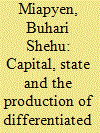

|
|
|
|
|
| Summary/Abstract |
This paper re-visits secondary literature on racial capitalism and problematises the Nigerian oil-dependent capitalist economy. The economy of oil extraction dispossesses the peasants of their land and exposes them to pollution. This Oil economy creates a contradiction by producing the agent of its transformation; the community-based social movements. The state and the capital respond to these contradictions by instrumentalizing differences to prevent communal solidarity. Consequently, the indigenous people are racialised as a minority people and within the oil-producing region as sub-ethnic communities. The absence of communal solidarity promotes unmitigated environmental disaster, state hegemony and high returns for the capital; local and global in Nigeria.
|
|
|
|
|
|
|
|
|
|
|
|
|
|
|
|
| 2 |
ID:
182408
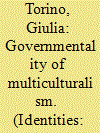

|
|
|
|
|
| Summary/Abstract |
Using a combination of discourse analysis in policy documents and ethnographic fieldwork, this paper interrogates the relation between Colombia’s pluri-ethnic turn and the governance of cosmopolitan multiculturalism in the capital city, Bogotá. Focussing on the city’s most important development framework, the POT (Plan de Ordenamiento Territorial), it reveals the controversy that exists between the multicultural discourses of the public administration (rooted in claims of ethno-racial equality and Affirmative Action) and their operationalisation in urban planning. In doing so, the paper conceptualises the urban governmentality of multiculturalism as the apparatus through which the municipality has been removing anti-racism and a race-informed understanding of socio-spatial dynamics from Bogotá’s official agenda of ‘cosmopolitan multiculturalism’. By drawing on Latin American racial theories of mestizaje, the paper thus extends the understanding of how neoliberal urban governance, while celebrating cultural diversity, denies the racialisation of space in the city.
|
|
|
|
|
|
|
|
|
|
|
|
|
|
|
|
| 3 |
ID:
182406
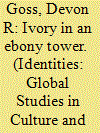

|
|
|
|
|
| Summary/Abstract |
How do white individuals establish themselves as authentic and belonging members of communities of colour? To explore this question, I examine the experiences of white students of Historically Black Colleges and Universities (HBCUs). In-depth interviews with 30 white HBCU students reveal the ways that white individuals navigate their whiteness in a space where they are deemed outsiders. Specifically, I demonstrate that white HBCU students use three strategies to differentiate themselves from whiteness writ large and establish belonging with this black community: acknowledging whiteness, wherein whites portray themselves as recognising white privilege; mitigating whiteness, wherein whites aim to balance the desire to participate in and preserve black spaces; and resisting whiteness, in which whites aim to dissociate from whiteness altogether.
|
|
|
|
|
|
|
|
|
|
|
|
|
|
|
|
| 4 |
ID:
182407
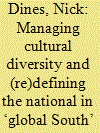

|
|
|
|
|
| Summary/Abstract |
This themed section brings together papers that were first presented at the conference ‘Cultural pluralism in cities of the “global South”’ held at the European University Institute in Florence on 20 and 21 March 2019. The three contributions explore the formation, representation and management of cultural diversity (broadly defined to include ethnic, racial, linguistic and religious diversity, today and in the past) in cities outside the West and how these processes get entangled with definitions and redefinitions of the nation and national identity (Triandafyllidou 2017). In doing so, they focus on a set of themes – the politics of cultural diversity, the transformation of the urban ‘global South’1 and the ongoing project of nation building – which, to date, have been addressed largely in isolation.
|
|
|
|
|
|
|
|
|
|
|
|
|
|
|
|
| 5 |
ID:
182404
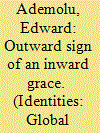

|
|
|
|
|
| Summary/Abstract |
Mainstream development discourse and practice often marginalise the significance of ‘religion’ and ‘faith’ for international development and humanitarianism. However, recent geopolitical events have prompted attitudinal and epistemological developments, with religion and faith considered an almost obligatory agenda for development scholarship. Despite current celebrations, scant attention is paid to the paramount role of religion for faith-based development actors such as African diaspora individuals and communities. Using focus group discussions, this article examines how the religious-faith identities of UK Nigerians specifically, shape their meanings for and engagement in international development. I reveal that Nigerian remittances and non-monetary contributions and services to their heritage country are constituted within moral (and cultural) obligations, justifications and values that are distinctly ‘religious’. So too, that Nigerians largely construe international development as a demonstrable ‘practice’ of their faith-based identities. Consequently, I call for a (re)theorisation of development to subsume transnational Afro-religious diasporic performativity. While focused on Nigerians, these findings are nonetheless relevant for wider UK-based African diaspora.
|
|
|
|
|
|
|
|
|
|
|
|
|
|
|
|
| 6 |
ID:
182409
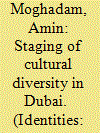

|
|
|
|
|
| Summary/Abstract |
This paper will argue that the pursuit of the UAE’s nation-state-building project, the implementation of neoliberal urban policies, and increasing security concerns together have led to the Dubai authorities projecting a selective, discretionary representation of diversity. Based on ethnographic accounts of the Dubai Art Fair in the city’s new urban spaces, the article aims to offer insights into the politics of cultural diversity in Dubai today.
|
|
|
|
|
|
|
|
|
|
|
|
|
|
|
|
| 7 |
ID:
182410


|
|
|
|
|
| Summary/Abstract |
This article addresses the ways in which the Moroccan state’s recent acknowledgement and promotion of cultural diversity has assumed form in the national capital of Rabat. It considers two cases – the official recognition of Amazigh culture and the development of new cultural infrastructure – in order to interrogate how urban restructuring in Rabat has become an expedient for transmitting a new sense of national identity to domestic and international audiences. In doing so, the article critically develops the idea of ‘diversity management regime’ to think about how diversity is operationalised in Rabat, the dimensions that get included and excluded within its remit, and the sorts of challenges it faces in the political arena. The contradictions that underscore Rabat’s transformation into a showcase for a multicultural nation are to be understood in the limits of the democratisation of Moroccan society over the last two decades.
|
|
|
|
|
|
|
|
|
|
|
|
|
|
|
|
|
|
|
|
|